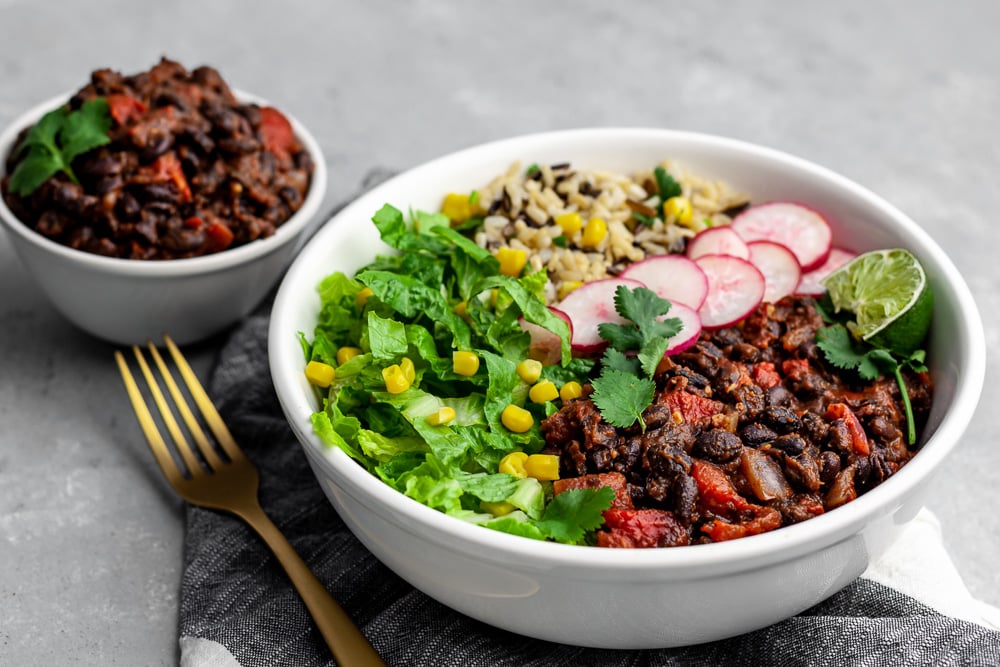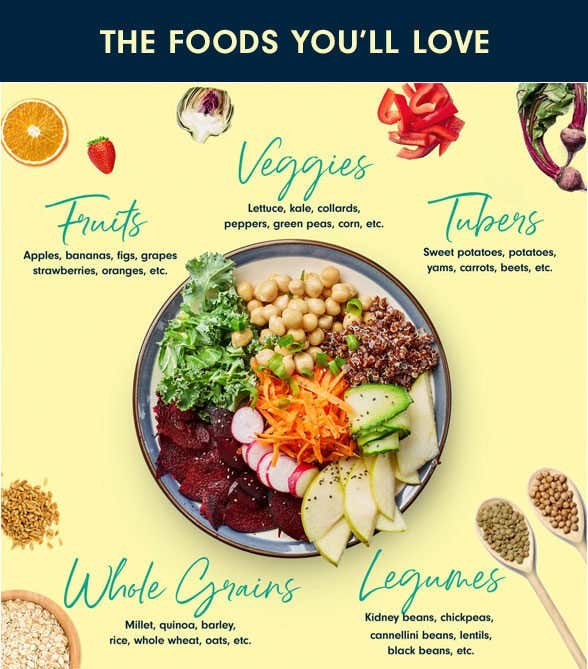How Gluten Free BBQ Sauce Elevates Your Vegan Grilling Game
Wiki Article
All About Healthy Food: Advantages of Enjoying Plant Based Alternatives
The conversation surrounding plant-based diets has obtained substantial attention over the last few years. Many people are exploring the possible wellness benefits, nutritional advantages, and environmental impacts related to these nutritional choices. As people become extra knowledgeable about their food's impact on health and sustainability, inquiries develop concerning the usefulness of taking on such a lifestyle. What details adjustments can one anticipate, and how might these options improve not just personal health however additionally the earth's future?Comprehending Plant-Based Diets
Although many individuals associate plant-based diet plans mainly with vegetarianism or veganism, these diet plans can include a wide variety of eating patterns that focus on whole, minimally processed plant foods. Such diets often include fruits, vegetables, whole grains, seeds, nuts, and legumes, while getting rid of or limiting animal items. This flexibility allows people to customize their dietary selections according to dietary demands and individual preferences. Some might adopt a primarily plant-based diet while still periodically consuming meat or dairy, usually referred to as a flexitarian approach. The focus remains on incorporating even more plant foods, which can result in a diverse selection of flavors and meals. Recognizing these different analyses of plant-based eating is necessary for appreciating its availability and allure in contemporary food society.Health And Wellness Conveniences of Plant-Based Foods
The health benefits of plant-based foods are considerable, offering a nutrient thickness benefit that supports overall health. Research shows that these foods can enhance heart wellness and play an essential function in efficient weight management. By integrating extra plant-based options, individuals may improve their dietary choices and promote long-lasting wellness.Nutrient Thickness Advantage
Nutrient thickness plays a crucial role in the wellness advantages of plant-based foods, making them a compelling choice for those looking for a well balanced diet regimen. Plant-based foods, such as fruits, vegetables, beans, nuts, and entire grains, are typically rich in important vitamins, minerals, and anti-oxidants while being reduced in calories. This high nutrient density enables people to take in less calories while still satisfying their dietary needs. Furthermore, these foods are packed with dietary fiber, advertising gastrointestinal wellness and assisting in weight administration. By including nutrient-dense plant-based options, consumers can improve their total wellness, support their immune systems, and minimize the risk of chronic conditions. Inevitably, the nutrient density of plant-based foods highlights their importance in a health-conscious way of living.Heart Health Improvement

Weight Management Support
Along with promoting heart wellness, a plant-based diet plan can significantly assist in weight management. This nutritional technique emphasizes entire foods such as fruits, vegetables, legumes, nuts, and whole grains, which are usually lower in calories and higher in fiber compared to animal-based products. The high fiber web content assists increase satiation, minimizing overall calorie intake. Moreover, plant-based diet plans are often rich in necessary nutrients while low in undesirable fats, making it less complicated to preserve a healthy weight. BBQ Sauces. Research study indicates that individuals that take on a plant-based lifestyle have a tendency to have lower body mass indexes (BMIs) and experience even more successful weight-loss compared to those who eat meat-heavy diets. Subsequently, welcoming plant-based alternatives is a calculated choice for efficient weight administration
Nutritional Value of Plant-Based Ingredients
Plant-based active ingredients are abundant in crucial nutrients, supplying a varied range of vitamins, minerals, and anti-oxidants that add to overall wellness. A contrast of protein sources reveals that while animal items are usually deemed premium, several plant-based options offer sufficient healthy protein and various other beneficial substances. Understanding the nutritional worth of these components can assist individuals make notified dietary options.Vital Nutrients in Plants
Nutrient-rich components discovered in plants provide a diverse array of important vitamins and minerals that contribute greatly to overall health. These ingredients are abundant in vitamins A, C, and K, which sustain immune feature, vision, and blood clot, specifically. In enhancement, plants give important minerals such as potassium, magnesium, and calcium, vital for heart health and wellness, muscular tissue feature, and bone toughness. The visibility of fiber in plant-based foods help food digestion and advertises a healthy and balanced intestine microbiome. Antioxidants, discovered generously in vegetables and fruits, aid combat oxidative anxiety and decrease swelling. Numerous plant foods are low in calories yet high in nutrients, making them an outstanding choice for those seeking to maintain a healthy weight while making sure suitable nutrient consumption.
Contrasting Healthy Protein Sources
Healthy protein resources vary considerably in their nutritional profiles, with plant-based components supplying distinct advantages. Unlike pet healthy proteins, which usually contain hydrogenated fats and cholesterol, plant healthy proteins have a tendency to be lower in these unhealthy components. Legumes, nuts, seeds, and entire grains are abundant in vital amino acids, fiber, vitamins, and minerals. Lentils provide high protein material alongside substantial iron and folate, while quinoa is a complete healthy protein, using all nine vital amino acids. Furthermore, plant-based healthy proteins are typically accompanied by antioxidants and phytochemicals that support general health. The shift to plant-based healthy protein resources not just enhances nutritional consumption but likewise aligns with lasting dietary methods, lowering ecological influence and promoting long-lasting wellness advantages.Environmental Impact of Plant-Based Consuming
As recognition of climate change expands, many individuals are exploring sustainable dietary choices that can significantly decrease their environmental footprint. Plant-based eating has actually arised as a substantial contributor to minimizing greenhouse gas exhausts, which are mainly connected with livestock manufacturing. The growing of fruits, grains, veggies, and legumes commonly needs fewer resources, such as water and land, contrasted to animal BBQ Sauces farming. In addition, plant-based diet plans can lead to decreased deforestation, as much less land is needed for grazing livestock or expanding pet feed. By shifting in the direction of plant-based choices, consumers can sustain biodiversity and advertise healthier communities. Generally, accepting plant-based consuming not just advantages personal health yet likewise represents an essential action toward ecological sustainability and conservation efforts.Conquering Common Misconceptions
While numerous individuals identify the advantages of a plant-based diet plan, a number of mistaken beliefs commonly hinder them from fully accepting this way of life. An usual belief is that plant-based diets lack adequate protein; however, numerous plant sources, such as legumes, nuts, and tofu, give ample protein. Additionally, some assume that this diet regimen is pricey, when actually, staples like beans, rice, and seasonal veggies can be quite cost effective. An additional false impression is that plant-based eating is extremely restrictive, whereas it in fact provides a diverse array of tastes and foods. Numerous stress that a plant-based diet plan may lead to deficiencies, yet with correct planning, people can get all required nutrients, consisting of minerals and vitamins, while taking pleasure in a wide selection of tasty dishes. Broad Tips for Transitioning to a Plant-Based Way of living Making the shift to a plant-based way of living can be an improving experience, though it typically requires some support to browse the preliminary changes. Initially, people are motivated to begin gradually, integrating even more fruits, vegetables, beans, and whole grains into their dishes while decreasing meat and milk usage. Meal preparation is essential; preparing a regular food selection can help relieve the adjustment and prevent last-minute undesirable selections. Exploring cooking methods and new recipes can likewise preserve and improve the experience exhilaration about plant-based eating. Furthermore, signing up with assistance teams or areas can provide motivation and share useful pointers. Staying informed about nutrition guarantees well balanced meals, stopping deficiencies while cultivating a healthy, enjoyable plant-based way of life.
Delicious Plant-Based Meal Concepts
Exploring scrumptious plant-based meal ideas can motivate individuals to accept a more nutritious diet. One prominent option is a hearty quinoa salad, including cherry tomatoes, cucumber, and a spicy lemon-tahini clothing. One more fave is a full-flavored lentil stew, packed with carrots, celery, and fragrant natural herbs, best for a comforting supper. For breakfast, over night oats made with almond milk, chia seeds, and topped with fresh berries supply a healthy start to the day. Furthermore, a lively vegetable stir-fry with tofu and a selection of vivid veggies can be a quick yet satisfying meal. Velvety avocado toast on whole-grain bread, sprinkled with seeds and seasonings, uses a straightforward yet tasty treat. These dishes showcase the range and splendor of plant-based consuming.
Frequently Asked Questions
Can a Plant-Based Diet Regimen Supply Enough Protein?
The inquiry of whether a plant-based diet plan can provide enough healthy protein prevails. Numerous resources, consisting of vegetables, nuts, seeds, and whole grains, can fulfill protein requires successfully, supporting a nourishing and well balanced diet for people.Are Plant-Based Diet Regimens Ideal for Children?
The viability of plant-based diet plans for children relies on cautious planning. Sufficient nutrients need to be guaranteed, consisting of vitamins, minerals, and healthy proteins. With correct advice, such diets can sustain healthy and balanced growth and development in youngsters.How Do I Eat Out on a Plant-Based Diet?
Eating in restaurants on a plant-based diet regimen includes seeking dining establishments with diverse menus, asking for adjustments, and exploring vegan-friendly choices. Preparation in advance and connecting dietary preferences can boost the dining experience while preserving dietary options.What Are Usual Allergens in Plant-Based Foods?
Typical irritants in plant-based foods consist of soy, gluten, nuts, and seeds - Gluten Free BBQ Sauce. People adhering to a plant-based diet regimen needs to be mindful of these irritants and review tags meticulously to stay clear of negative reactions and assure safe consumptionCan Plant-Based Diets Aid With Weight-loss?
Research indicates that taking on a plant-based diet regimen may help with weight-loss due to its usually reduced calorie thickness and higher fiber content. This combination can improve satiety, assisting people manage their caloric intake successfully. Lots of individuals connect plant-based diet plans generally with vegetarianism or veganism, these diet plans can include a large array of consuming patterns that focus on entire, minimally refined plant foods. Nutrient thickness plays an important role in the health benefits of plant-based foods, making them a compelling option for those seeking a balanced diet regimen. Plant-based diet regimens have actually been revealed to significantly enhance heart wellness, as they commonly consist of aspects that support cardio function. In addition to advertising heart health, a plant-based diet can significantly help in weight monitoring. An usual belief is that plant-based diet plans lack enough healthy protein; nevertheless, numerous plant sources, such as beans, nuts, and tofu, offer enough protein.Report this wiki page